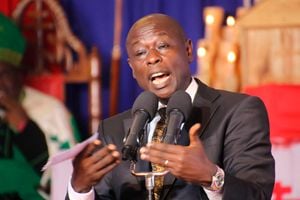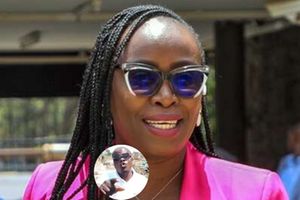Women must not shy away from political parties’ nominated seats

Gilgil MP Martha Wangari. She was elected in 2017 after serving a term as a nominated senator.
What you need to know:
- There has to be a constant and unpleasant reminder of the struggle of the Kenyan woman in seeking to participate in the electoral process.
- A look at Parliament and county assemblies’ composition tells a story of hope.
With only seven months to the August 9 polls, we are basically in the campaign season, never mind it is not official.
It should be a time to look forward to as a rare opportunity for wananchi to have their say on how they want to be governed. But it is also a constant and unpleasant reminder of the struggle the Kenyan woman has to undergo in seeking to participate in the electoral process.
Despite lots of advocacy and ‘empowerment’ of why women should participate in elections as aspirants and candidates in droves, in addition to enlightening society, nothing much has happened. The more things change, the more they remain the same—the political field is still uneven, stubbornly in favour of men.
However, a look at Parliament and county assemblies’ composition tells a story of hope. It has been a long journey to achieve the current numbers. Progress is slow, nonetheless in elective positions. It calls for more intentional action to combat obstacles and barriers to increase numbers of women in the Legislature.
These include focusing on dealing with societal attitudes and breaking the thick walls of patriarchy (it is tedious). But political goodwill remains key. Honest commitment to the cause for a gender-balanced political participation and sharing of power in those spaces, elective or nominated, is not only significant but also strategic in expanding, guaranteeing and safeguarding our democracy.
Gender-based violence
Regrettably, almost all the valiant women, who have thrown down the gauntlet and contested various elective seats or have been nominated to the Legislature by parties, have had to contend with violence, physical, emotional and even sexual. The result is discouraging other women from seeking political leadership.
Physical and other forms of violence and harassment against women, when they are in the field campaigning or seeking nominations, is more pronounced.
However, there is a category of women politicians who are recipients of sexualised attacks, almost all the time—the women who get nominated through political parties’ lists, referred to as special seats. Critics who pour all manner of sexist vitriol against these female politicians who are elected by political parties by virtue of the work put into ensuring the outfits land in Parliament. Afraid of being branded, some women shy off from working (competing) within political parties, including for nomination.
Frankline Mukwanja, the executive director of the Centre for Multiparty Democracy, urges women to ignore “the insults and insinuations” and proudly take up nominations to party lists. “Nominated seats are a great training ground for women in Parliament,” he says. “History has proved this. We encourage political parties to continue electing women through their lists, and women picked for the slots should take them up with pride. It is about taking power through which you get into political process.”
Exemplary work
He singles out Supreme Court Judge Njoki Ndung’u, Senator Abshillo Halake, Gender Affairs CAS Beatrice Elachi and former MP Amina Abdulla as some of the parties’ nominees who have used the Parliament slot to do exemplary work.
Gilgil MP Martha Wangari, elected in 2017 after serving a term as a nominated senator, describes nominations as a good platform to raise the presence of women in leadership and encourage their electability. Ms Elachi and Ms Wangari, former nominated senators, point out that the Constitution refers to the political party list process as an election.
“I was elected by UDF in 2013 having done a lot of mobilisation for one year of its formation. It is most unfortunate that they (those elected via party lists) are sometimes treated as less members in the National and County Assemblies,’’ Ms Wangari observes.
Addressing the Voice for Women and Girl’s Rights-Kenya/Journalists for Human Rights annual human rights conference last month, Ms Elachi, a former Speaker of Nairobi’s County Assembly, asked journalists to put election to the party list into context, to guard against misrepresentation.
“Women are tired of situations where the (nominated) are bundled together, complete with sexualised tags and branding once they are deservedly elected to political party lists, never mind having worked hard for it and gone through a process,’’ the CAS stated, cautioning journalists against falling prey to propagandist campaigns.
Ms Rugene, a former Parliamentary Editor of the Daily Nation, is founder, The Woman’s Newsroom Foundation. [email protected]; @nrugene





